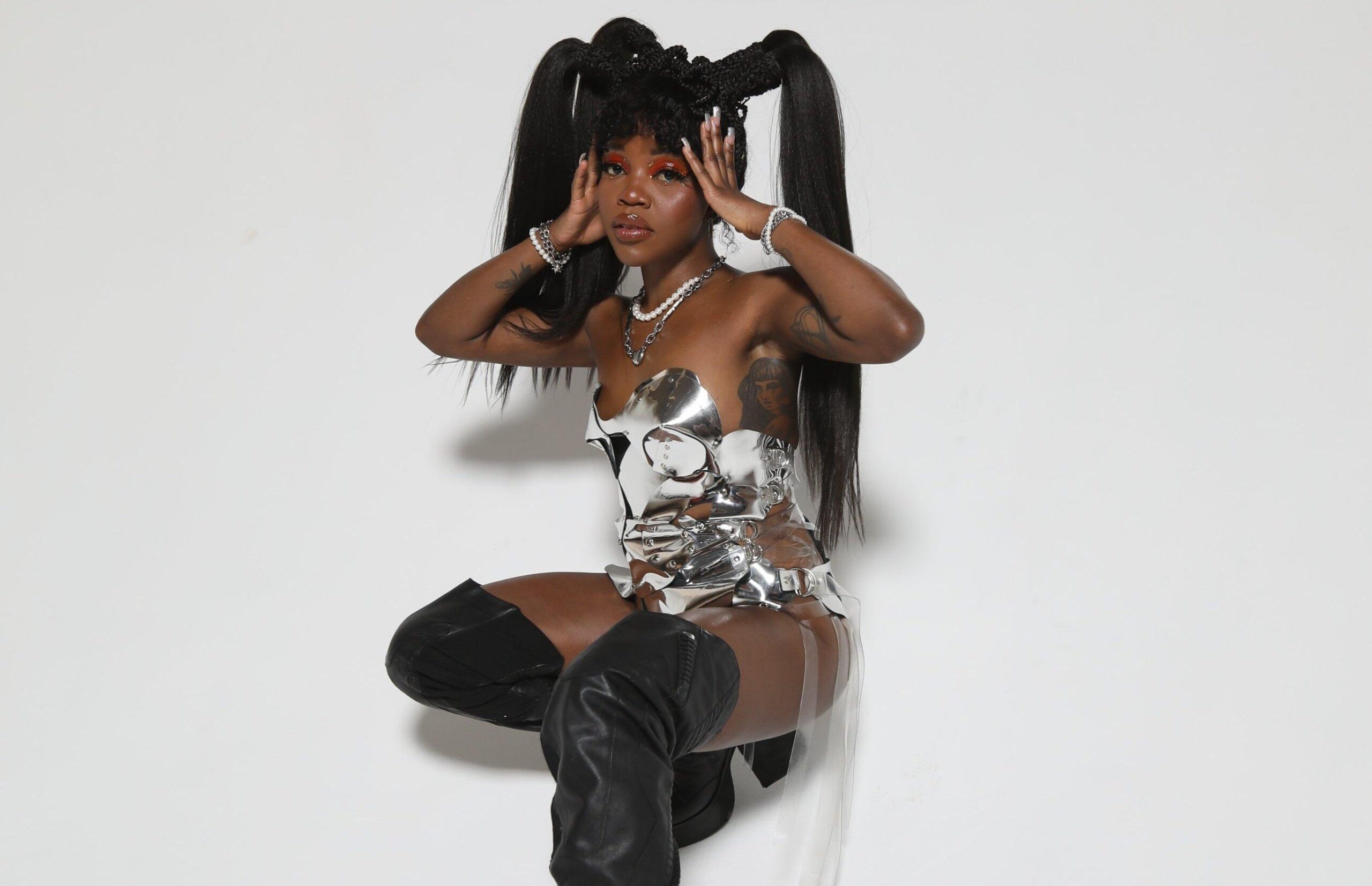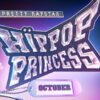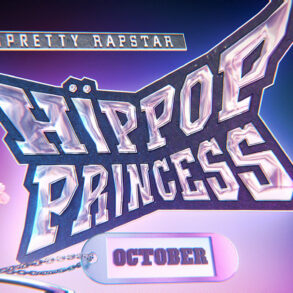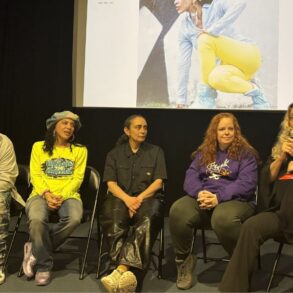
British alt electro trio London Grammar have been putting out emotive records that perfectly straddle the worlds of cinematic alternative, ala Florence + The Machine, and moody dance music, with big name DJ remixes and collabs a major part of their catalog. This is in a big part due to frontwoman Hannah Reid, whose haunting voice can soar over and weave into seemingly any beat, evoking strength and tenderness in a single breath.
Reid met guitarist Dan Rothman in 2009 in college, who recognized her talent off the bat and pushed her to perform. Keyboardist and drummer Dot Major joined a year later, and after finished school, the trio moved to London, where Reid and Rothman are originally from. As soon as they began releasing music, London Grammar made waves.
Back in 2013, they landed the closing feature on Disclosure‘s massive dance chart topping debut album, Settle, bookended by the release of their debut single, “Metal & Dust” and LP, If You Wait. That year was peak moment for both alt/indie bands and euphoric dance music, and they not both fit in perfectly with the current sounds, they also offered a unique fluidity between them that has allowed them to continue to sound fresh and exciting.
In 2017, they dropped their sophomore album, Truth Is a Beautiful Thing, but the persistent, grating sexism she faced within the music industry was forcing Reid to seriously consider if she could stay in it. 2019 brough another massive dance collab, “Let You Know” from Flume, which Reid shares they wrote during a very dark time for her.
Yet in August 2020, amidst the unpresented global shutdown, London Grammar returned with the euphoric summer love jam, “Baby It’s You,” the lead single to their new album, Californian Soil, released today, April 16. The powerful, deeply emotive project is not only a musical triumph for the band, it is the result of a healing journey for Reid, who used it to channel her anger and frustration and find strength and power in the process.
Shortly ahead of its release, GRAMMY.com caught up with Reid over the phone to learn more about the emotions behind the new album, stepping into her role as bandleader, her experience with sexism in the industry, and more.
The third London Grammar album comes out soon. What does California represent to you?
California, to me—basically those lyrics just came out when I heard the music. Dan [Rothman] in the band had this guitar loop with that beat on it, and it just evokes those lyrics and that imagery. I do think that California has this kind of mysticism to it.
It’s a place built on this extraordinary landscape. It’s got a lot of layers to it and that’s why people do write about it a lot. It seems to be on the tip of everyone’s tongue and I don’t really know why, but it’s such a beautiful word as well. It’s one of those words in the English language that just is really beautiful in itself and makes you feel things.
Why did you choose “Californian Soil” as the title track of the album and how does it point to the rest of what’s explored on the album?
It’s funny, when I said that I wanted the album to be called Californian Soil, everyone was like, “That doesn’t make any sense, you’re called London Grammar. People will just get confused. You’re not from California.” And I was like, that just makes it even more amazing, even more reason to have that as the album title.
It was also one of the first songs that we wrote in the process [of making the album], the first two songs were “America” and “Californian Soil.” That’s why the album is bookended by those two songs.
Those songs mean so much to me because before writing those songs, I wasn’t in the best place. I wasn’t really sure if I could do this anymore for a living. And then we wrote these two songs, and I loved them so much. And it felt appropriate then to either name the album America or Californian Soil.
Listening to the album, I definitely feel a lot of emotions, there’re a lot of tracks and themes on it that really grab you. For you, while you were working on the project, what sort of emotions were you tapping into?
It was very emotionally intense for me, definitely as emotionally intense as the first album, which I think is a good sign. The emotions I felt, I mean, I started off in quite a negative place and then I feel like this album healed me in a way. So, there’s definitely light and shade emotionally on there. It has love songs that are very personal to me. And it also has a lot of darkness on there, which is obviously something that London Grammar does have usually. And a lot of anger, I was quite angry when we started.
I wanted to talk a little bit more about what it felt like for you stepping into the role of the leader of London Grammar on this album. And I know you mentioned that you were in a dark place when you started, did you feel like stepping into that role and claiming that space helped you move through those emotions?
Yeah, I think it did. I think that for me, it was a little bit of a now or never moment. I felt like I just wasn’t or hadn’t done a very good job, I wasn’t fulfilled by my role.
Obviously, being a woman in the music industry, it’s been harder for me sometimes to be respected by certain characters, not necessarily my bandmates, but people external to us. And I felt like, if we’re going to have longevity, this needs to stop happening. I can’t feel this way because it’s so draining.
And in order for that to change, people have to know that I’m the leader of the band when we step into the room. Even if the music is then made in a democratic way, the lyrics are mine, a lot of the songs are mine and it is my story. And the boys just completely understood that and we agreed. I think they felt sad for me that I had felt the way that I had felt. And I don’t know, maybe I hadn’t made it that clear to them at times.
On this project, what did the songwriting and collaborative process generally look like with you and the band?
It started off in a very intimate way, which, again, is actually how the first album was made. A lot of the songs were written in pairs, so it was just either me and Dan, or Dan and Dot, or me and Dot. And we basically built up an album of demos. We had a lot of demos, a lot of material. And then it was only at the very end of the process that—it was actually our A&R who sent a couple of the songs to George FitzGerald.
It’s funny, it’s one of those moments, [our A&R] actually did it without fully telling me he was going to do it. And I was really annoyed. And then he played me the songs and I was like, “No, they sound really good.” So, we sent the parts to George FitzGerald and he added some magic on a couple of songs. And then, also at the end of the process, I did a writing session with Steve Mac, which was quite scary, but turned out really great. But essentially, 90 percent of it was made by us three alone.
And how do you feel bringing on the co-producers for a couple of tracks, George and Steve and Charlie [Andrew], how do you feel like that shifted the sonics versus your other projects?
To be honest, and this is in no way a disservice to the people that were involved, but I think what was great is that we had a lot of the sound already there, we weren’t trying to find a sound through going into studios with other people.
I think for us as a band, that was quite key. And then what it was about with getting, with George and Charlie, they had a production role, it was about adding a bit of magic and tying together some loose ends. Charlie rerecorded my vocal on a couple of songs and he rerecorded some of the guitar parts and stuff.
With Steve, it was more of a writing thing, which is a whole other interesting process because I actually have had a lot of very unsuccessful writing sessions in the past. So, I was nervous to do that, but he was really lovely and I really loved working with him.
I just love the euphoric, summary vibes of “Baby It’s You.” I know that came out last year, but now that it’s spring here in L.A., I’m vibing with it again. What was the inspiration for it?
Exactly. We wrote that song, I think, in the summertime and it is about summer and being at festivals. And it’s quite a meaningful song, again. It is a love song, it’s about finding yourself.
I’m really glad you say that because I think that’s actually quite an important part of music sometimes, the weather, and I don’t think it’s something to be dismissed. And I hope that with the album coming out there are those summery euphoric moments, and I hope that this summer will be a bit more hopeful and people will therefore connect with the music.
I also love “Lord It’s a Feeling”—it just really feels raw and powerful, with heartbreak and those difficult emotions. What did it feel like for you writing about that in a direct, honest way?
That was quite a scary one actually. And I think you can hear it, because I swear in that song and, wow, I suddenly get a bit quiet because I don’t think I’ve ever done that before. Obviously, I personally connect to those lyrics as well, and what’s hard sometimes about being a songwriter is you don’t want anything to be revengeful, but sometimes that’s a real emotion too. I just feel like, unfortunately, that’s the price you pay as an artist. I wanted to just be honest about the experience that I’ve had in the past, but also that some of my girlfriends have had too.
And when you were recording it and singing it, what did it feel like for you?
It felt very cathartic, it did feel really good. I feel like sometimes I, as a woman in music industry, I’ve been a bit discouraged from expressing anger and I just didn’t like that. And I think it’s such an important part of this album for me. It doesn’t have to be a negative thing. I don’t think like that at all.
“It felt very cathartic… As a woman in music industry, I’ve been a bit discouraged from expressing anger and I just didn’t like that. I think it’s such an important part of this album for me.”
It’s so true. I think women generally are discouraged from being angry. So, it’s really powerful to hear and feel those emotions in music. If you feel comfortable sharing, what are some ways you’ve been pushed away from being honest in the industry, or from releasing certain songs?
Yeah, sure. I mean, it’s funny when I first started talking about this in interviews, specifically the [February 2021] NME one, I shared the funny stories that had happened, the more lighthearted ones; the [more] sexist things that happened, I didn’t actually share. Because I felt, I don’t know, scared to really say what the experience was like.
There are women in the music industry who have experienced far worse than me, of course. But it was an absolute daily battle that I was not prepared for. And at the start of our career, we were surrounded by different people, we work with different people now. And I just felt it extremely profoundly, they did things like we didn’t really have full access to even our schedule. And when I asked to see the schedule, I wasn’t sent it. And I mean, that happens to young artists no matter who you are, but there was a lot of stuff like that.
Things weren’t transparent, let’s put it that way, no matter whether it was the scheduling or financially, with deals and stuff like that. And I remember asking nicely and that not working and then becoming a bit more frustrated and then feeling very put in my place.
And when it became a real issue and I became really angry, like, “I want to see my own schedule!” and of course, things were getting booked left, right and center that we weren’t approving. I just had the most profound experience that I was treated like I was being absolutely irrational. We didn’t have the control that we needed at the start of our career, and on top of that, battling for that control.
I remember specifically there was one person in particular who we worked with. If we were going to speak to them, I would have to get Dot to speak to this person because I knew I couldn’t communicate with this person at all. Again, that’s one example, but being on the road was hard, and walking into studios when it being assumed that I was not really a musician, even if I wrote the song.
That was quite a funny one because I’m like, literally there is nothing else I could do to prove that I am a musician when we’re working on the song that I’ve actually written. But it was kind of death by a thousand cuts, those little experiences amounted to actually something that was really tough. And now I feel like I can speak about it and I don’t want to dwell on the negativity. I hope that I’ve turned that negativity into something more positive, which is an album and feeling strong in that.
Switching gears a bit, your 2019 collab with Flume, “Let You Know,” was massive. What was it like working with him?
It was really great. He was over in London and he’s a friend, he’s a really great guy. So it was very easy. Again, when we did that collab, I wasn’t in the best place. I think my confidence was really low. So, I’m glad that it was with someone who was so nice. He was quite patient while we were finishing the song. And I’m a massive Flume fan. It was definitely a “pinch me” moment for sure.
What did you feel like when it was released?
I felt really excited and just like, “I wonder how this will go down.” With Spotify, it’s sometimes kind of hard to tell how something’s actually being received. I performed the song with him when he did a show in London and I think that was really when I felt it the most. I was like, “Oh, this is just so great.”
Was everyone singing along?
Yeah, they were. And it was also really fun because it wasn’t a London Grammar gig, I went out and I did one song. It was just like walking into a party for five minutes and then leaving.
I was wondering if we could hear a little bit about your path into the music industry? When did you first start performing and making music, and at what point did you start thinking about it as something that you would pursue professionally?
So, I was always writing songs and singing, but I am a deeply creative person, so I never considered that you really even could do it for a career. And I didn’t really understand what the music industry was.
It was only when I met Dan, before we met Dot, where he was like, “Oh, you’re really good. We’re going to do a gig.” And “I booked it in and it’s next week and we’re going to do it.” And I was like, “Oh, okay. I’m really scared and I don’t know how I feel about this.” And then it was a bit like that every step of the way. When we then signed a record deal, I was like, okay, I guess this is happening. I don’t really know what just happened, but I guess I’ll just go with it.
And it’s probably with this third album, so it’s taken me this long to be like, actually, this is a career. And asking myself “How do I want this career to look?” Because yes, I’m very creative, but I do think they are important questions because then you don’t get taken advantage of, when you know exactly what it is that you want. And probably only now, do I really understand that.
And do you remember how old you were when you first started writing music, and what you were writing about?
Yeah. I mean, just so many boys who just really upset me when I was really young. I remember my first songs that I wrote when I was 11, 12, 13, just those painful angsty teenage songs, which, really, a lot of that was on the first album. But my mum does say that I was making up songs when I was like four, five, six. I don’t really remember, but apparently I was.
Kali Uchis On What It Means To Be A Latin “Crossover” Star In The 21st Century
This post was originally published on this site be sure to check out more of their content.






